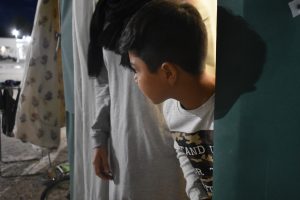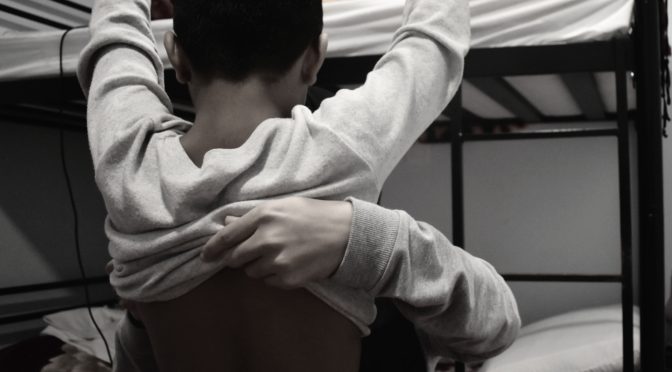”Will we be reunited?”

Marriage is not only a traditional cultural ceremony. It is also an official proof that the two people who got married and their children constitute a unified family which should not be broken. Differences in nationality, religion, race between wives and husbands should never justify the splitting of a family. Moreover, whenever circumstances force members of a family apart, the simple fact that they belong to the same family unit should be adequate reason to have all members reunite. Unfortunately, none of the above applied to my experience. After eight years of shared life with my husband and children, the moment I reached Europe as a refugee, my family was broken up and I was classified as a single mother.
When we arrived in the Moria refugee camp, on Lesvos, Greece, together with my disabled husband (he has a palatine bone in his leg) and my 8 years old son, we went to the asylum registration office. When our data were registered, they asked us for our marriage documents. We handed them over only to have them rejected in the harshest way possible.
The woman behind the registration desk added: “Your marriage document is not valid here. It indicates that you got married in Iran while you are from Afghanistan. Therefore, we will register you as separate individuals, not as husband and wife. So, your husband will be officially registered as a single man and you as a single mother, without a guardian. As for the boy, he will be registered under your responsibility.”
It was really hard to accept that the European law did not recognize the validity of our marriage after 8 years of shared life and that it could break our family apart.
Since my husband has a disability, most of the legal process was done by me. However, there was no trouble to follow up our asylum application process. Yet, with each step in this process, my mind and my heart were pulsing for my boy, worrying about his condition as we could not even get the permission to live in the same tent. Being responsible for him without being next to him scared me, because my son is a passionate boy and very head strong.
The palatine bone in my husband’s leg was causing him great trouble. Everything was becoming very hard for each one of us. We had come to Europe, hoping to get treatment for my husband, but he was getting more and more vulnerable. Many people were getting transferred from Moria. Among them my sister who was almost in the same condition as I, but for different reasons. Although she had arrived with her husband, she was registered and recognized as a single mother. Because her husband had two wives and could be considered officially responsible for one of them, he chose to be with his elder wife. As a result, my sister was considered a single mother and her two young girls received assistance from the authorities as orphans.
In spite of all the difficulties, I was trying to follow the medical process of my husband so that his asylum application could take into consideration his disability. However, we did not manage to get any answers from the doctors to certify his vulnerability before the first review of the asylum application. Thus we got the red stamp in our first and second registration in the asylum office, in other words, our request for asylum was turned down.
When we could not find any alternative, we turned to the illegal solutions and we put our lives in the mercy of smugglers and strangers. There was no other option and not even time to think about consequences including the dangers of the trip itself. My only concern was to get out of there and rescue myself and the future of my son.
The smugglers could find a way to transfer us from Moria to the mainland and the Ritsona camp, where my sister was already living.
Now I too live in Ritsona camp. When I first arrived here, I was secretly sheltered for two months in my sister’s house. During those two months, I was living in fear of getting arrested and being pushed back to Moria camp.
After, two months, we decided to speak about our accommodations with the authorities of the camp. I was not sure that they would accept and understand my condition or would speak with the police to arrest me and send me back to Moria.
However, I was a bit optimistic, as Moria was under fire at that time and there was less possibility to be pushed back to Lesvos.
Today, I live with my nine-year old son at Ritsona. Here, I face different sorts of problems. At the same time, my husband is in a new camp, Kara Tepe, on Lesvos, where everyone’s life is in danger and basic human rights are violated. He had hardly rescued himself from the fire in Moria and, now, as one thousand more people are living there, he is suffering inhuman conditions, exposed to Covid19, having asylum process problems.
Here, I am deprived of all rights that other inhabitants have, as our cards ATM cards are cut, and even during the quarantine there was no consideration about our nutrition, including the possibility of distributing baskets of dry food.
Here, even those who are healthy are getting vulnerable, not because of physical problems, but because of psychological problems. Every time that I speak with my husband and ask about his condition, I feel very sad. He is suffering there too much and, as a single man, he is treated very harshly by the authorities. I also feel very bad that even my own illnesses, mostly about my lungs, is being forgotten among all these troubles, while it is getting worse and worse.
I am a woman who is a mother and a wife. I cannot stop thinking of my husband who is locked up in an inhuman environment, surrounded by wires and the virus. How much longer do I have to suffer away from my husband? How much more should I stay silent against my son’s desires as a child, who is getting discriminated and bullied emotionally by other children?
Will we ever be reunited as a family?

